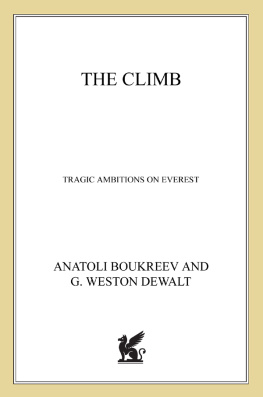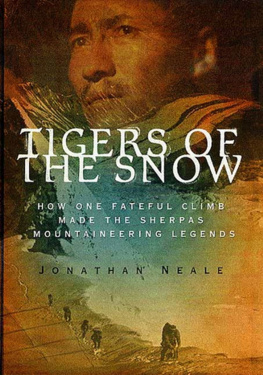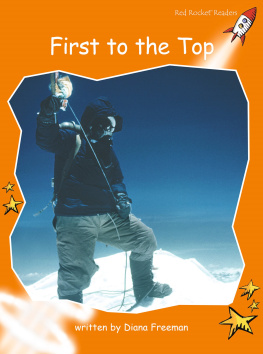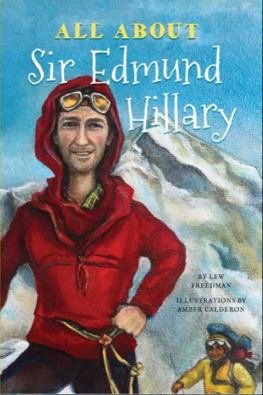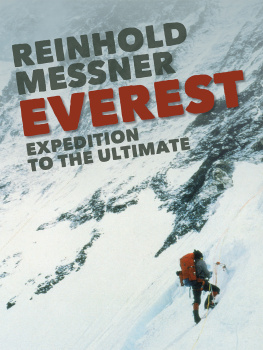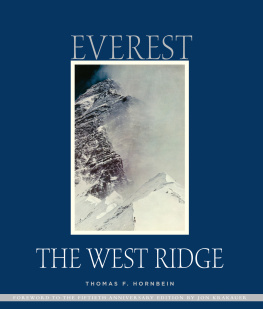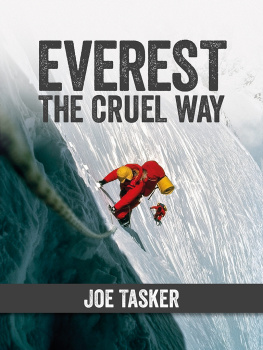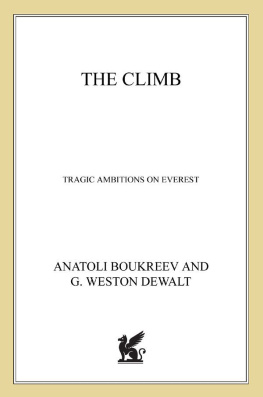Five days after the Everest tragedy of May 10, 1996, nine climbers sat in a circle at the Mountain Madness Everest Base Camp and recorded their thoughts and memories. Many of the details and some of the quotes in this book are drawn from those recorded recollections. Anatoli Boukreev, a participant in the taped debriefing, has drawn upon that source and wishes to thank everyone who participated. Their attempts at truth-telling and self-reflection have added considerably to the historical record. Quotes, when taken from the debriefing tapes, have been noted with this symbol:
The authors would like to offer their thanks to those individuals who contributed to this effort, some of whom, for reasons of privacy, have asked not to be publicly identified. To the members of the 1996 Mountain Madness expedition to Mount Everest we are most grateful.
Many contributed to the weave and texture of the moments and events that led to this book. We extend our appreciation to: Reina Attias, Kevin Cooney, Charles Ramsburg, Michele Zackheim, Bob Palais, Charlie Mace, Perry Williamson, Gary Neptune, Laurie Brown, Michael DiLorenzo, Todd Skinner, Jack Robbins, David Shenk, Alex Beers, Elliot Robinson, Fleur Green, Christian Beckwith, Anne Krchik, Dr. Roger Miller, Beth Wald, Sue Fearon, and Greg Glade.
To Jed Williamson, former president of the American Alpine Club and current editor of the annual Accidents in North American Mountaineering, Weston DeWalt owes a special thanks. His encouragement of this effort was a consistent source of support.
Two translators/interpreters, Natalya Lagovskaya and Barbara Poston, saw us through the entire project, and the final shape of the words on these pages are due largely to their untiring efforts.
Our primary researcher, sometimes interviewer, was Terry LeMoncheck, whose commitment to this effort was a true gift. It could not have been done without her.
For her belief in our project and her enduring efforts, we extend our thanks to Kathleen Anderson of Scovil, Chichak and Galen.
To our editor at St. Martins, George Witte, we offer our sincerest gratitude for his efforts in guiding us on the mountain that was this book.
To a special friend, Linda Wylie, we both owe our deepest of thanks. Her hospitality, graciousness, level-headedness, and commitment to the human spirit brought us, more than once, out of the clouds and down to the issues.
Climbing today is not only mainstream, it is business, and with that comes the rising tendency for climbing decisionsobjectives as well as tactical decisions on a climbto be business decisions as well. The up side to that is that now climberslike skiers and sailors before themcan make a living from what they love to do. The down side can be seen in increased crowds at the crags, the proliferation of new regulations aimed at climbers, and today and forevermore, the circus at Everest Base Camp.
CHRISTIAN BECKWITH,
PREFACE , AMERICAN ALPINE JOURNAL , 1997
The mountain doesnt play games. It sits there unmoved.
BRUCE BARCOTT,
CLIFFHANGERS , HARPERS MAGAZINE , AUGUST 1996
In ancient Buddhist scriptures the Himalaya are referred to as the storehouse of snow, and in 1996 the storehouse was filled again and again as unusual amounts of snow fell in the mountains.
In the early evening of May 10, 1996, a particularly vicious storm blew into Mount Everest and lingered at its highest elevations for more than ten hours. Twenty-three men and women, mountaineers who had climbed the mountain that day from its southern side in Nepal, could not make it to the safety of their highest-altitude camp. In a virtual white-out, battered by hurricane-force winds strong enough to blow over a semitrailer truck, the climbers fought for their lives.
The mountaineers had been caught in the Death Zone, the elevations above 8,000 meters where extended exposure to subzero temperatures and oxygen deprivation combine and kill, quickly.
As the climbers fought for survival, they were often blind but for an arms length. Sometimes there were ropes to secure and guide them. The pressure gauges on their oxygen tanks fell to zero, and the raging confusion of hypoxia began to conquer most rational figurings. The foretelling numbness of frostbite pushed the possibilities of amputations from remote to probable. In the dark and the screaming howl of the storm the climbers began to bargain. My fingers for my life? Fair enough; just let me live.
Below the descending climbers, in the high-altitude camp they were struggling to reach, a Russian mountaineer and climbing guide was fighting his own battle: yelling, cajoling, and pleading with other climbers to assist him in an effort to rescue those who were above, lost in the storm.
Anatoli Nikoliavich Boukreev made a decision, one that some would later call suicidal. He decided to attempt a rescue, to go into the storm solo, into a pelting blow of snow, into a lacerated darkness, into the roar of what one climber described as a hundred freight trains passing over your head. Boukreevs efforts resulted in what the mountaineer and writer Galen Rowell would later call one of the most amazing rescues in mountaineering history.
Two weeks after the disaster on Mount Everest, Boukreev flew from Kathmandu, Nepal, to Denver, Colorado, where he was met by friends and driven to Santa Fe, New Mexico, to recuperate from his ordeal. Upon arriving, he asked to meet me, because a few months earlier, at a mutual friends request, I had arranged for him the purchase of a camera and its delivery to the Everest Base Camp. On May 28, 1996, we met for the first time.
I had seen photographs of Boukreev that had been taken prior to the events on Mount Everest. Lean, taut, with a confident smile, is how I imagined him. As I walked into our mutual friends house, he rose slowly from a chair to greet me. His eyes were sunken, tired. The tip of his nose and places on his lips were crusted in black, the telltale dead skin that comes with severe frostbite. He was distant; he looked as if hed moved out of his body and into a place that had no address.

